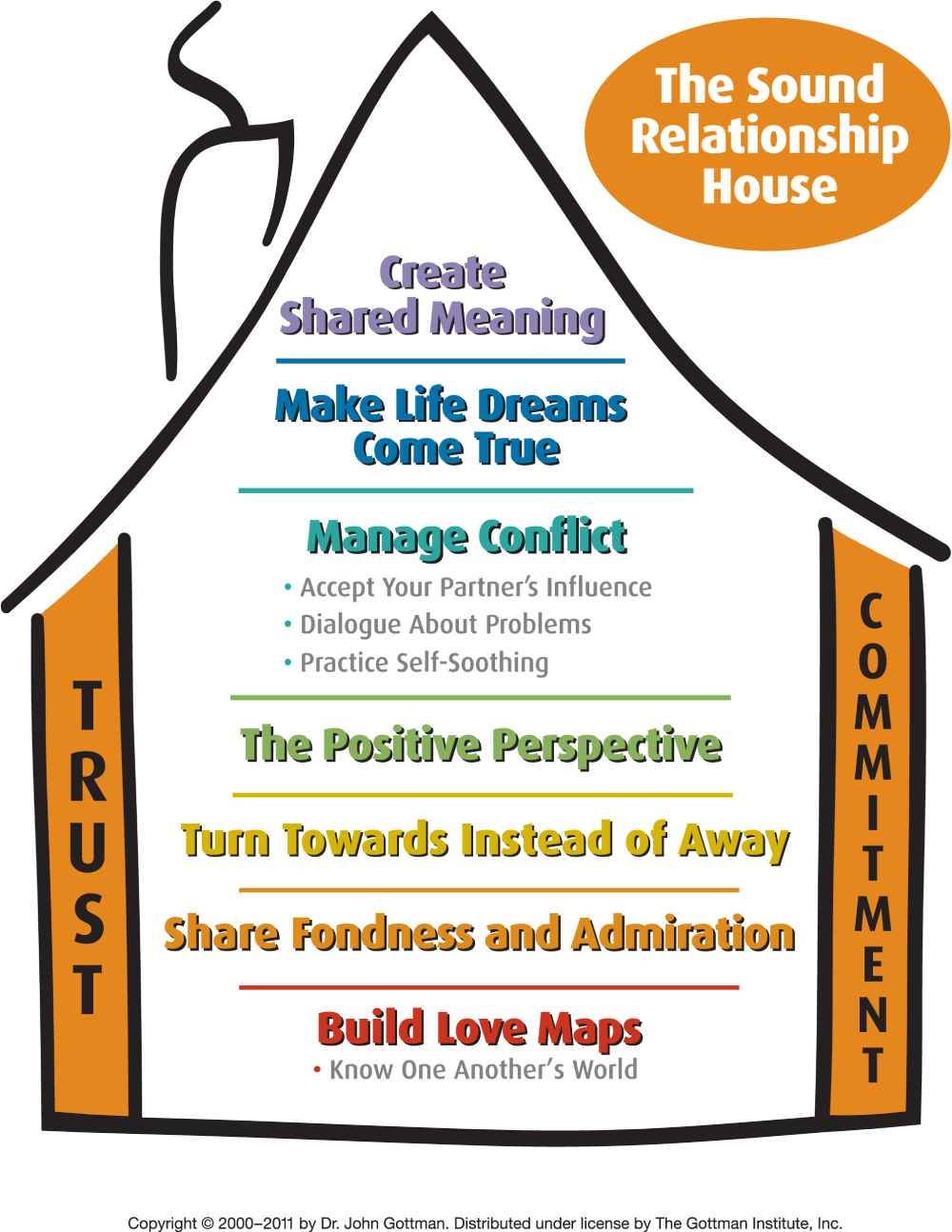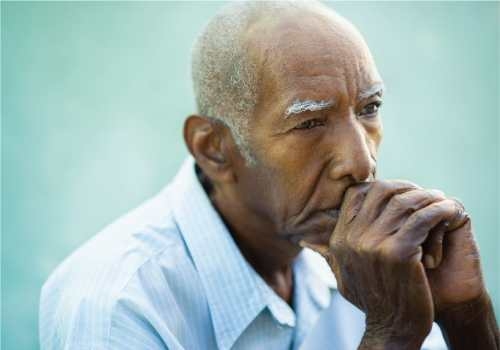

To understand how trauma affects the way we relate to our loved ones, we must first understand the components of a sound relationship.
The Sound Relationship House is a useful framework for understanding the impact of trauma on a relationship

When my clinicians and I work with all couples, we focus on the Sound Relationship House’s three domains:
It’s important to understand how each area can be affected by trauma to know what to do about it for healing.

In the Friendship Domain, we identify 3 “levels” of interaction, starting with Building Love Maps. This is the level of how well we know one another as partners. In a healthy relationship, we create a “map” of our partner’s world and continually update it by keeping the interest and curiosity alive. We ask questions. We have conversations. We come to know and be known at a deeper level over time and we are willing to be vulnerable and share at a deeper level if the relationship is safe.
Trauma can impact this level in a couple of ways. First, if the betrayal is from within the relationship, “I no longer know you” becomes the dominant feeling. The partner thinks, “What I thought I knew doesn’t match the information and image I had.” There are lies and deception that are traumatic in and of themselves.
Second, if the trauma comes from a shock event, it can seem to change our partner into someone different because of the overwhelming nature of trauma. Someone who once “had it all together” or was outgoing or compassionate may behave in opposite ways post-trauma: disorganized or fragile, withdrawn, fearful, numb.
Finally, if the trauma is from developmental trauma from childhood, it can be almost like a ghost in the room that overshadows, or colors, day-to-day interactions.
To paraphrase Dr. Julie Gottman, she explained it somewhat like this:
While people are dating, life is fun, exploratory, ideal. Once a couple shifts from dating mode into married/committed mode, the partner shifts into being “family.” If trauma came from one’s family to begin with, the brain now projects family expectations, fears and reactions onto the partner, distorting the relationship. (Treating Affairs and Trauma Training, The Gottman Institute).
The Love Maps level is often blurred with confusion and curiosity is dampened, so updating the Love Maps slows down or stops altogether.

The second level of the Friendship Domain is “Fondness and Admiration.” In a healthy relationship, couples nurture positive thoughts about their partner, scan for the good, praise and reinforce one another, cherish and admire their partner, and accept and value differences. This is easily done in the early phases of a relationship. But even for couples without trauma, it can be all too easy to slip into patterns of focusing on the negative, becoming critical of one another, forgetting what we loved and liked about our partner in the first place.
When trauma is added to the picture, for any number of reasons, our partner may appear scary, dangerous, repulsive or boring. Instead of nurturing gratitude, the traumatized partner starts to nurture resentments. A person with trauma may vacillate between idealizing and vilifying their partners or may even confuse their partner with the “enemy.” She or he may use criticism to push the partner away. People with trauma often find it very difficult to take in the positives of their partner’s fondness, love, and admiration. So, both giving and receiving love and affection are difficult. If the partner with trauma stops being affectionate, the partner may despair that their love is gone.

The third level of the Friendship Domain is 1) making bids for needs and connection, and 2) turning towards one another’s bids. To navigate this level well, a person needs to be in tune with their feelings, desires, values and needs; and to articulate them to their partner. The emotional numbing from trauma can definitely interfere with this level, as it will be difficult to be in tune with oneself well enough to make a bid.
Hyper-vigilance from the trauma can also distort what a traumatized person perceives from the bids made to them from their partner. They may startle with benign affectionate gestures or become easily overstimulated by multiple bids. Then, they may respond by turning away (ignoring/avoiding) or turning against (reacting with harshness, anger, criticism) instead of turning towards (receiving).
If the trauma was sexual, anything erotic may seem threatening, or the person with the trauma may use a traumatized response to “endure” sex. Trauma may also make impersonal, pornographic sex more appealing than sex with interpersonal intimacy. For them, the vulnerability of interpersonal intimacy is intolerable.
What to learn more about The Gottman Method? Join us and transform the future of your family!
Couples
In the Domain of Managing Conflict, many elements of healthily managing conflict may be “off” as a result of the trauma. Most couples, even under the best of circumstances, have trouble managing conflict well. It’s tough work for all of us!
Trauma creates a heightened sense of fear and feeling out of control. The person with trauma may become overly controlling towards the partner as a way to offset this discomfort. On the other hand, the trauma victim may become overly compliant as a way to “control” their partner’s emotions or reactions. To avoid conflict, one or the other partner may compromise too early, leading to increased distance or more intense conflict down the road. Depression, addiction or mood swings can lead to new problems and gridlock.
With anxiety running in the background, responses to bids or approaches for conversation may be harsh. Instead of understanding and empathy, the person with the trauma may respond to any bids with criticism, demands or blame. This behavior almost inevitably invites defensiveness into the interaction.
To manage conflict well, a couple has to be able to regulate their emotions and physiology. If not, the result is to become “Flooded,” where the heart rate is over 100bpm, blood pressure is high and a person is in a fight/flight/flee mode of reaction. Being in a Flooded state makes it difficult to stay present and available for discussion and problem-solving.
At times, a person with trauma may even provoke conflict to manage their emotions and feel in control, leaving the partner to feel baffled and destabilized. With combat-related trauma, problems at home may seem trivial and meaningless, leading to less engagement with one’s partner than what is needed to reach understanding and problem-solving. Conflicts may trigger explosions of anger or even abuse, especially if substances are involved. Fear, inability to concentrate and difficulty empathizing with others can also contribute to not managing conflict well.
The potential for all 4 Horsemen – Criticism, Contempt, Defensiveness and Stonewalling – is higher with trauma in the room. (The 4 Horsemen are behaviors that The Gottman Institute has been identified as the predictors of divorce.)

Finally, the Dreams/Shared Meaning Domain can be affected by trauma as well. As mentioned above, dreaming and sharing oneself requires self-knowledge and a willingness to be vulnerable to be known.
For couples who do this well, this Domain tends to be a lovely place of dreaming, exploring, sharing and supporting. There is flexibility to accommodate personal growth and changes over time.
But trauma inhibits this experience. The partner with trauma may not be able to access underlying feelings, dreams or meanings to share. The traumatized person can’t plan the future because of a lack of being in tune with themselves, a loss of hope, or a sense of a foreshortened future, as a result of trauma. The person with trauma may have difficulty empathizing with their partner’s dreams and may diminish their partner’s values as superficial or trivial. Hopelessness and despair may obscure creating a sense of purpose and meaning. With the experience of trauma, there tends to be more rigidity in life than flexibility. Changes in one’s partner can feel destabilizing and scary.
Trust is one of the fundamental elements that is negatively impacted by trauma. Trust is lost in everyone, including oneself. Remember, the earlier definition of trauma as a “separation from one’s true self.”
Trauma survivors often feel their body or reactions betrayed them. They may also feel betrayed by those around them, whether it is merited or not. As Dr. Van Der Kolk puts it, “After trauma the world becomes sharply divided between those who know and those who don’t. People who have not shared the traumatic experience cannot be trusted, because they can’t understand it. Sadly, this often includes spouses, children and co-workers” (The Body Keeps the Score, p. 18).
Since the “nuts and bolts” of building trust lie in all of the domains described above, each area that is negatively impacted trickles into the overall sense of trust in the relationship. Healing Is Within Reach
Clearly, trauma impacts not only the individual experiencing it, but also the intimate relationship with one’s partner and family members. The good news is that we now know more than we ever have in treating trauma. And we’re still learning. There is help available! I strongly believe nobody needs to suffer needlessly. Healing is within reach. And each person deserves to feel safe and loved. Period.
Couples Workshop
What to learn more about The Gottman Method? Join us and transform the future of your family! Register Couples
Have you or your partner experienced a traumatic event? Here’s what you need to know about trauma – both the small and big traumas – and how it affects your relationship.







